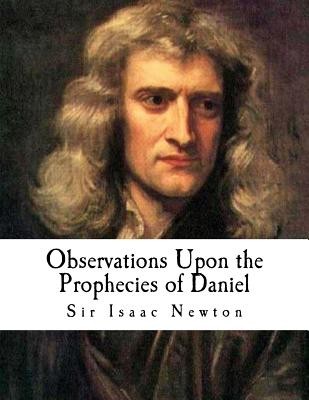
- We will send in 10–14 business days.
- Author: Isaac Newton
- Publisher: CreateSpace Independent Publishing Platform
- ISBN-10: 1979317429
- ISBN-13: 9781979317429
- Format: 21.6 x 28 x 0.6 cm, minkšti viršeliai
- Language: English
- SAVE -10% with code: EXTRA
Reviews
Description
Observations upon the Prophecies of Daniel
and The Apocalypse of St. John
By Sir Isaac Newton
On the other hand, latitudinarian and Newtonian ideas taken too far resulted in the millenarians, a religious faction dedicated to the concept of a mechanical universe, but finding in it the same enthusiasm and mysticism that the Enlightenment had fought so hard to extinguish. Newton himself may have had some interest in millenarianism as he wrote about both the Book of Daniel and the Book of Revelation in his Observations Upon the Prophecies.
Newton's conception of the physical world provided a stable model of the natural world that would reinforce stability and harmony in the civic world.
Newton saw God as the masterful creator whose existence could not be denied in the face of the grandeur of all creation. Nevertheless, he rejected Leibniz' thesis that God would necessarily make a perfect world which requires no intervention from the creator. In Query 31 of the Opticks, Newton simultaneously made an argument from design and for the necessity of intervention:
For while comets move in very eccentric orbs in all manner of positions, blind fate could never make all the planets move one and the same way in orbs concentric, some inconsiderable irregularities excepted which may have arisen from the mutual actions of comets and planets on one another, and which will be apt to increase, till this system wants a reformation.
- Author: Isaac Newton
- Publisher: CreateSpace Independent Publishing Platform
- ISBN-10: 1979317429
- ISBN-13: 9781979317429
- Format: 21.6 x 28 x 0.6 cm, minkšti viršeliai
- Language: English English
Observations upon the Prophecies of Daniel
and The Apocalypse of St. John
By Sir Isaac Newton
On the other hand, latitudinarian and Newtonian ideas taken too far resulted in the millenarians, a religious faction dedicated to the concept of a mechanical universe, but finding in it the same enthusiasm and mysticism that the Enlightenment had fought so hard to extinguish. Newton himself may have had some interest in millenarianism as he wrote about both the Book of Daniel and the Book of Revelation in his Observations Upon the Prophecies.
Newton's conception of the physical world provided a stable model of the natural world that would reinforce stability and harmony in the civic world.
Newton saw God as the masterful creator whose existence could not be denied in the face of the grandeur of all creation. Nevertheless, he rejected Leibniz' thesis that God would necessarily make a perfect world which requires no intervention from the creator. In Query 31 of the Opticks, Newton simultaneously made an argument from design and for the necessity of intervention:
For while comets move in very eccentric orbs in all manner of positions, blind fate could never make all the planets move one and the same way in orbs concentric, some inconsiderable irregularities excepted which may have arisen from the mutual actions of comets and planets on one another, and which will be apt to increase, till this system wants a reformation.


Reviews